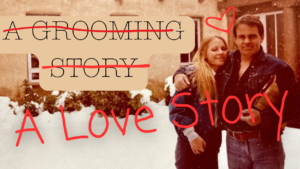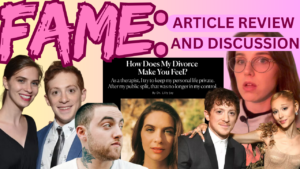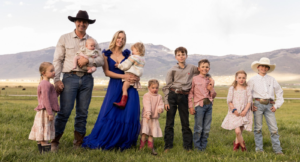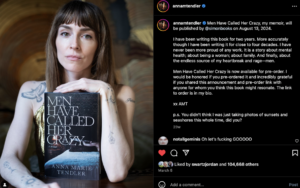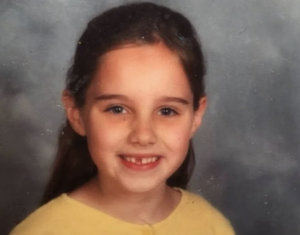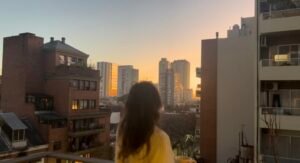Trigger warning: this essay contains mentions of sexual assault, rape, and violence.
Two asterisks (**) indicate that the name has been changed to protect the privacy of those mentioned.
Author’s Note: Choosing to publish this was not a decision I took lightly. I wrote it as a form of catharsis, but I was very hesitant to share it after completing it, so I sought out the advice of those close to me and, notably, Gabrielle Vega. Together, we decided that the story was worth sharing as it could serve as a warning to young women travelers and because it was Carey Bajorek’s wish, as we understood it, that more people would learn about what happened to her daughter.
In 2015, I was studying abroad in Seville, Spain, when I got an email with a subject line starting with “terrible news.” In the proceeding email, our study abroad program director informed us that a young woman in our program named Lauren Bajorek had passed away following “a tragic accident.”
A friend of mine on the trip named Amaya** responded to the email asking for more information. She was again told that there had been an accident and they could not offer any more details at that time. We speculated that there could be a criminal investigation going on, and perhaps that was why they couldn’t tell us more.
A few weeks later, at an outdoor table full of American students sipping sangria, Amaya would share, “I never believed for a second that that girl’s death was an accident.” Flushed from the sweet red wine and the nighttime heat, I slapped the table, threw my arms up, and said, “Thank you! Finally, someone is making some sense!”
I was 20 at the time– almost ten years ago. Lauren had died on the night of her 21st birthday.
For nine years, I couldn’t write about this. Not because Lauren was a close friend of mine; in fact, I didn’t know her personally. But I did know the man whose apartment she was in the night she died. At first, part of the reason I struggled so much with putting this story into words was that I was taking the wrong approach. I set out initially to tell Lauren’s story before realizing that the story I needed to tell was mine.
Because in the summer of 2015, despite what I believed at the time, I was young and vulnerable, as so many travelers are. And where there is vulnerability, there is often someone who arrives to take advantage of it. When I ultimately decided to write about this, it was because I wanted it to serve as a warning. The following story is about how predatory people can get close to us, and how they often get away with it.
I arrived in Seville in June 2015 as part of a program called CIEE that I had applied for through my university, Penn State. Once we arrived, I was put in a small group with six other students, and we were assigned a sort of “culture guide.” Everyone in the program had a culture guide whose role it was to show us around Seville and help us assimilate. These culture guides were our age or a little older, and they were all from Spain, working part-time with CIEE while they completed their studies or worked elsewhere. Our culture guide was named Ignacio.
Ignacio was well-dressed with blue eyes and combed light brown hair. He told us he was studying to be a lawyer. But Ignacio was aloof and somewhat disinterested, and he couldn’t answer many of the questions from our studious little group about Seville and its history. On our first day, CIEE announced that our culture guides would be showing us around the city and teaching us about famous locations. I found myself envious of my friends in another group whose culture guide was a smiley young woman who seemed knowledgeable and excited to talk about her home.
When we stepped out for our tour, the other students and I buzzed with excitement around the golden city. Once the capital of an expanding Islamic empire, Seville is a cultural blend of Northern African mosques and Catholic Spanish cathedrals. Hot, sunny, and dry, especially in the summer, Seville architecture utilizes outdoor spaces to build regal gardens, fountains, and aqueducts where princes and princesses once roamed among peacocks and orange trees. We felt incredibly fortunate to be there, and we peppered Ignacio with questions, but we were met with generalized or unrelated answers. While we took pictures in the Plaza de España and teased about jumping in the fountain to avoid the heat, Ignacio sat on his phone and then rushed us along after just a few minutes.
Ignacio was in a hurry because his goal wasn’t to enrich our understanding of Andalusian culture but rather to take us to the Discover Excursions headquarters.
Ignacio herded us into a small travel agency with photos of fantastic locations on the walls. CIEE hosted students from various schools, mostly the University of Texas and Penn State, and inside this travel agency, there were enormous flags from our schools. The school flags, plus Ignacio bringing us there, led me to believe that this travel agency, Discover Excursions, was associated with Penn State, or at least with CIEE. Ignacio told us that if we wanted to take any weekend trips to see more of Europe, then we should visit Discover Excursions, and we would get a discount.
In the office, there was a desk dwarfed by the Penn State flag over it. Behind the desk sat a man who looked to be about in his 40s with greased black hair, textured skin, a little beer belly, and a big white smile. He stood and stuck out his hand to me, introducing himself as Manuel White.
Manu asked me how old I was and where I went to school.
“I’ll be a junior at Penn State in the fall,” I told him, shaking his hand.
“Oh, Penn State,” he replied with a grin, glancing at Ignacio. “I love Penn State girls. You girls know how to party.” I closed-lipped-smiled politely and immediately thought to myself: What a creep.
That night, Ignacio texted our group that he would be taking us out to a bar in the city. After arriving, I hung out mostly with my little tour group, getting to know them and enjoying their company. But there were many groups from CIEE there; in fact, we filled the bar with upwards of 40 people. I remember that at one point, I went to the bathroom, and when I came back, most of my friends had moved to another table, except for one, David**, who had stayed at the table by my drink.
“You left your drink unattended,” he anxiously told me and handed it back to me. I took it back from him and scoffed, feeling criticized. I told him not to worry so much.
But we were all a bit on edge about sexual assault. Only a few days prior, CIEE had shown us a presentation about avoiding rape while traveling. They told us a story about a woman on a study abroad trip who was attacked by a stranger in the dark while in an outdoor restroom, and another student in the program knocked down the door to save her. We were told never to be bystanders and to stick up for one another. I sat in the presentation and fantasized about being a hero.
But that night in the bar, I had no idea just how woefully unprepared I was to stand up for myself or anyone else. While our group chatted and sipped on our drinks, I got a Snapchat from a friend in another group who was sitting at home. Her culture guide was the young woman I had seen earlier who seemed charismatic– I can’t remember her name. In the Snapchat image, my friend made a pouty face. “Why weren’t we invited?” she asked. “My culture guide is boring,” she complained in her next photo.
I looked up and realized that of all the groups there, our culture guides were all men, and they were all friends with each other and with Manu. Manu was present at the bar, advertising Discover Excursions. I had assumed that this was an event through CIEE, but I did find it strange that my friend’s group hadn’t been invited.
While I talked with my friends about Spanish and school, Ignacio came around and handed us raffle tickets. Already a little tipsy, I glanced at it and said, “Thanks,” without thinking much of it. Then, about an hour later, one of the culture guides who was with the Discover Excursions group came over and asked for my ticket. He looked at it and told me, “You won!”
“I won!” I replied. Then I blinked, then laughed. “What did I win?” I hadn’t even registered that there was a raffle going on, and I certainly didn’t remember putting my name down for anything.
“You won a free trip to Lagos, Portugal,” the guide informed me. “A free trip with Discover Excursions.”
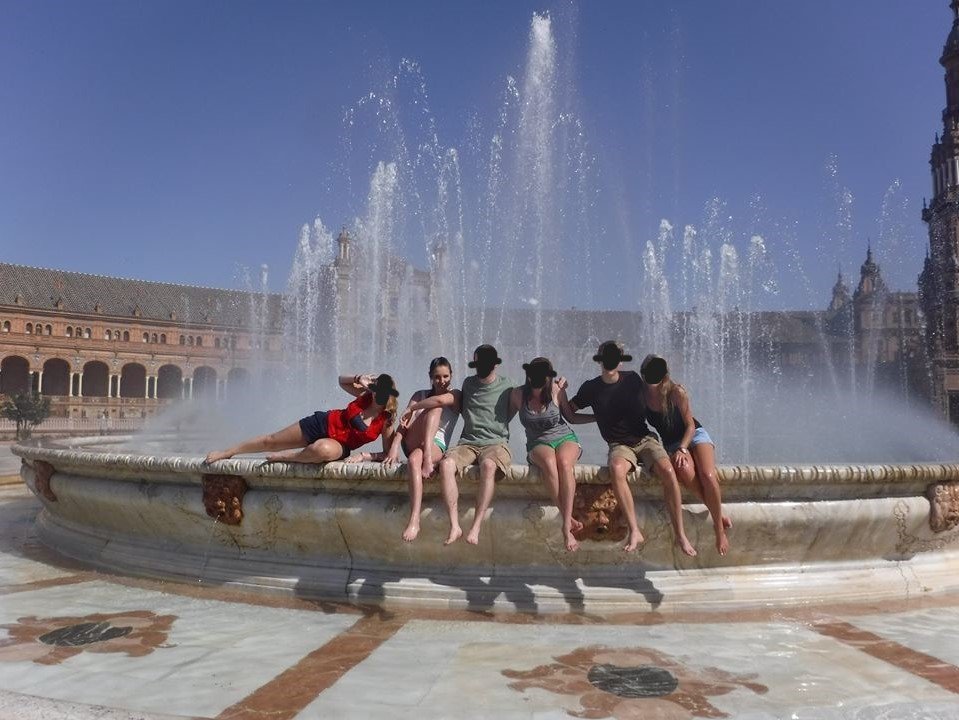
That night, I would message Manu on Facebook about my free trip. I was confused because I hadn’t given my name to anyone or even paid for the raffle ticket. But he assured me that I would get the trip. When talking to Manu, I remembered a tip that my dad had given me any time I was planning on leaving home for a while: “Beware of people who pounce.”
From the moment I met him, Manu had pounced. And I could feel it. I was uneasy around him. But I was excited about the possibility of a free trip to a gorgeous beach town, and I talked to other people in the program who were going and who assured me that it was trustworthy. So I reported to CIEE that I was going on a trip with Discover Excursions to Portugal, and I promised my parents on the phone that they had nothing to worry about.
We arrived for the weekend-long trip where Discover Excursions had organized two large buses. I looked around and realized that all the people who were directing the trip were the same young men who were our culture guides, and while the people in charge of the trip were all men, the people going on the trip were almost all women. I chalked this up to the fact that the people who participate in study abroad programs focused on the humanities tend to be mostly women.
Of the trip organizers, Manuel was the only one who was middle-aged. The rest of the men who worked for him were in their 20s and 30s, from all over the world, and– I couldn’t help but notice– all handsome. Other girls on the trip noticed as well, and those who were interested would spend the weekend flirting.
I didn’t know it at the time, but Lauren Bajorek was on one of those buses. She had won a free trip, just like I had.
I think back on the Lagos trip, and I remember that I was in a teenaged foul mood the whole weekend, probably due to the combined factors of sun exposure, limited nutrition, and alcohol consumption. As soon as we arrived, Manuel led us to the beach, where he had made a huge bowl of spiked punch. As we entered the beach from the stone hotel stairs, he handed each of us a cup full of punch. I received the drink, took a sip, and immediately gagged from how strong it was. I took a picture of the beach and posted it on Instagram with the caption, “Well, hello Lagos, aren’t you beautiful?” We suntanned and swam as Manu pushed us to drink more and more. The trip organizers gave out free Discover Excursions tank tops that said “You Only Lagos Once” and encouraged us to post on Instagram, tagging #DiscoverExcursions and #YouOnlyLagosOnce.
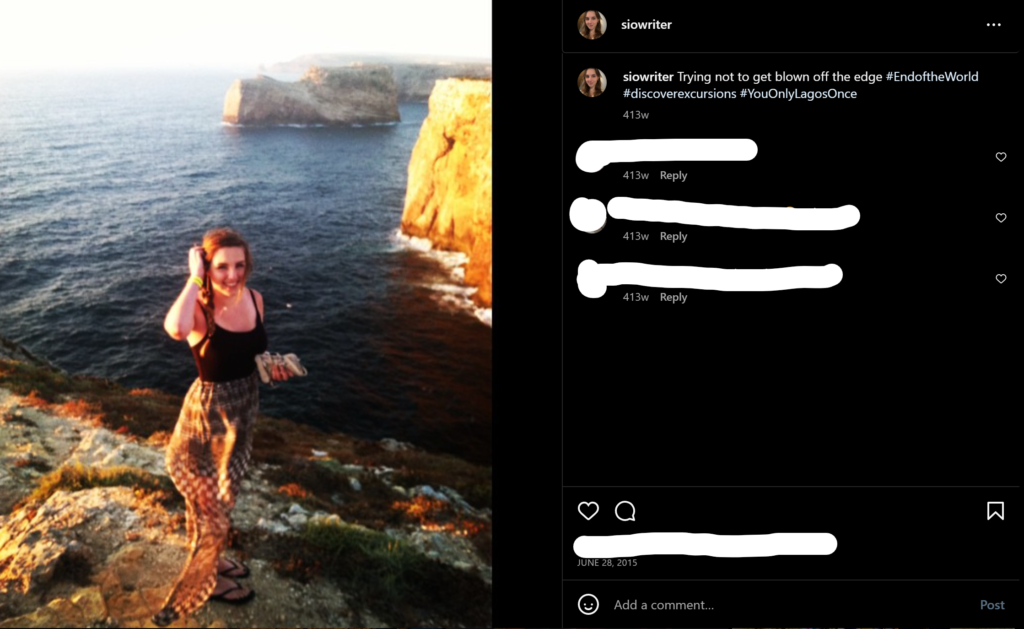
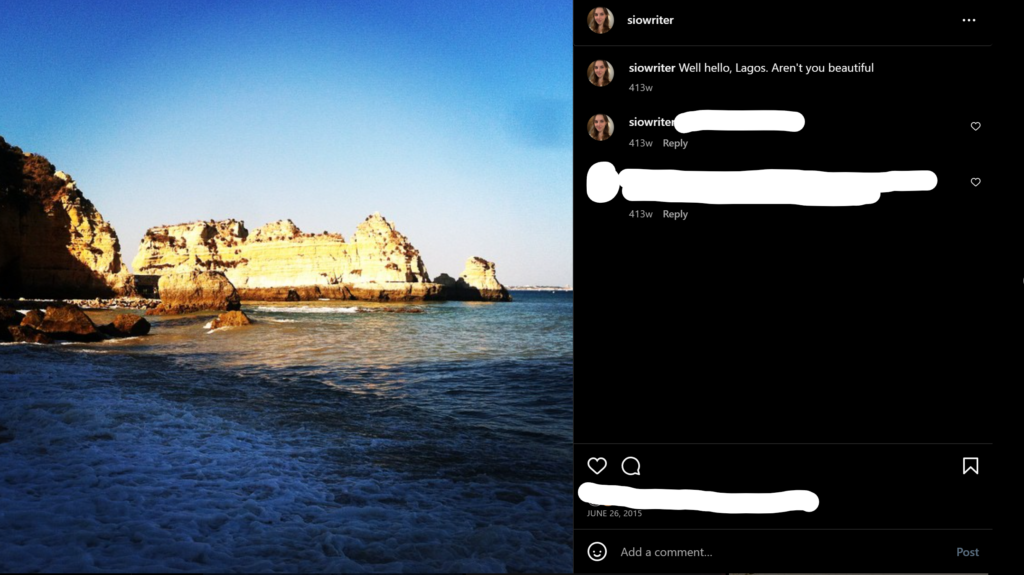
Manuel constantly told us that Lagos was very dangerous, and it was his job to take care of us, so he couldn’t let us go out alone. Traveling to any foreign country, especially one where you don’t speak the language, can be nervewracking, and most of us believed Manu when he echoed our parents and program directors telling us that we need to be careful, so we placed our trust in him.
That night Manu took us to a bar again. Manuel started to buy me shots and tease me about not being drunk enough while cheering on the girls who drank more. I was already hungover, sunburned, and hungry from that morning at the beach, and I was miserable with him. I tried to refuse the drinks, but he continued buying me so many that I started turning around and giving them to other random people at the bar so I could stay relatively sober. He got up on a table to dance and tried to pull me up with him, but I yanked my hand out of his. I tried to dance around and talk to people, but I really didn’t want to be there. A bit later, I found Manu outside the bar with a group of men smoking.
“I’m going home,” I told him. “I’m tired.”
“It is very dangerous out here at night,” he reminded me. “I will walk you home later.”
“I want to go home now,” I insisted.
Then Manuel became angry. “You know,” he told me, “you said that you went to Penn State, but I do not believe you. Penn State girls are fun, and you are no fun. You are boring.”
I turned my hands over and furrowed my brow as if to say, What is your problem? Then I asked him, “Where do you go to school, Manu?”
“I’m not in school,” he said and muttered something in Spanish to the group of men around him that made them smirk.
“Really?” I asked. “Then why do you spend so much time with college kids?”
It was my best attempt at sass or an insult at the time. He just waved me off. I turned to leave, irritated and hoping that I would remember the route home in the dark. As I walked away on the cobblestone road, Manuel shouted halfhearted protests after me about the danger, instilling fear, but I ignored them and quickly made my way back to the hotel with my head on a swivel the whole walk home. As soon as I made it into the lobby where there was WiFi, I called my boyfriend at the time back in the States, and I cried.
“I’m not having any fun, and I don’t like these people,” I told him. “I want to go home. I feel like I can’t be happy.” He assured me that I would be home soon enough.
The next morning, the girls I was rooming with talked about Manuel and “the guys” and said how much they liked them.
“Manu’s a creep,” I said. “You don’t think he’s creepy? He’s like 50 years old; why is he flirting with 18-year-olds?”
“Noo,” said one of the girls, drawing out the word sympathetically. “I could see that, but I think he’s just like, a dad. He’s such a dad. I think he cares about us and wants us to be okay.” I considered the possibility, but I wasn’t ready to dole out forgiveness and understanding in my aggravated, extended-hangover mood.
That next day, Ignacio and one of the other guys in charge of the trip, a blonde Australian who looked to be in his late 20s or early 30s, drove us to an overlook point to take photos of the views. As he drove us, Ignacio bragged about all the American girls he’d had sex with. He said a girl from Penn State invited him to the U.S., where, he claimed, he fucked his way through the sororities. He boasted about how easy it was since he was European and had an accent. He mocked the girls’ high voices as they told him, “Say something in Spanish!” so that they could post him on their social media.
“You’re a dog,” I told him impulsively, and I was met with sounds of protest from the other people in the car.
“What?” I defended myself, “he’s being gross.”
Another girl in the car with cool style, trendy tattoos, and a friendly demeanor told me, “Aw, leave him alone. Shit, I’d be bragging too if that many people liked me.” I shut my mouth and looked out the window, embarrassed by my actions and feeling like a bitter Puritan.
The next morning we packed our bags to take the bus back to Seville, and I remember that the girls in my room, especially the one who had defended Manuel, seemed very different. They were quiet, somber, and distracted. The night prior, I had opted to stay with a friend while they partied in our room, and the place was trashed with an inexplicable layer of water covering the floor with used tissues, Q-tips, and a broken pair of heels thrown in it. I didn’t hide my distaste, and as my roommates left, I picked up the heels and passed them to one of them, passive-aggressively adding, “You forgot these.” Half paying attention, she took them from me, and I scolded them, saying, “You know, somebody has to clean this up, even if it’s not us.” My roommate blushed and agreed quietly, then she tossed the heels in the trash and left. I look back on this memory, knowing what I know now, and I ask myself what happened to her the night before, and I wish I had treated her with more kindness.
On the ride home, Manuel sat by me, smiling as he teased and poked me. “Maryyyy” he said over and over in a sing-song voice. I never told him that everyone calls me by my middle name, Siobhan, because I didn’t want him to know me or consider me a friend. I talked to the people on the bus about my family coming to visit soon and asked him if he could recommend places to visit or restaurants in Seville. He joked that he would only recommend the expensive places and said, “Mary’s daddy can afford it. Mary’s daddy has money. I can tell.” I don’t remember what I replied. I just remember the discomfort– the palpable disgust that I felt around him as if my body was setting off alarms, telling me to stay far away. I was glad when the free trip to Lagos was over.
In a few weeks, my family came to visit me, and I would spend any time that I wasn’t studying with them. Upon meeting my host mom, my dad removed his sun hat and said in rehearsed Spanish, “Gracias por cuidar a mi hija,” or “Thank you for taking care of my daughter.” I knew they worried about me, but I didn’t worry much about myself. At 20, I considered myself an adult who already had it all figured out. Looking at the old pictures now as I wrote this article, I couldn’t help but shake my head at how young I was, how little I looked. That’s how old Manuel White’s victims were. We didn’t see that vulnerability in ourselves, but he did.
It was the last night of my family’s visit that Lauren died. I learned of her death right after my family left from the email that CIEE sent to everyone in the program. After receiving that email, I suddenly felt very alone and small. I thought I should have gone home to the States with my family. For about four days, I avoided leaving my apartment, and I stayed in, ordering food and texting other people in the program about Lauren. But no one knew how she died.
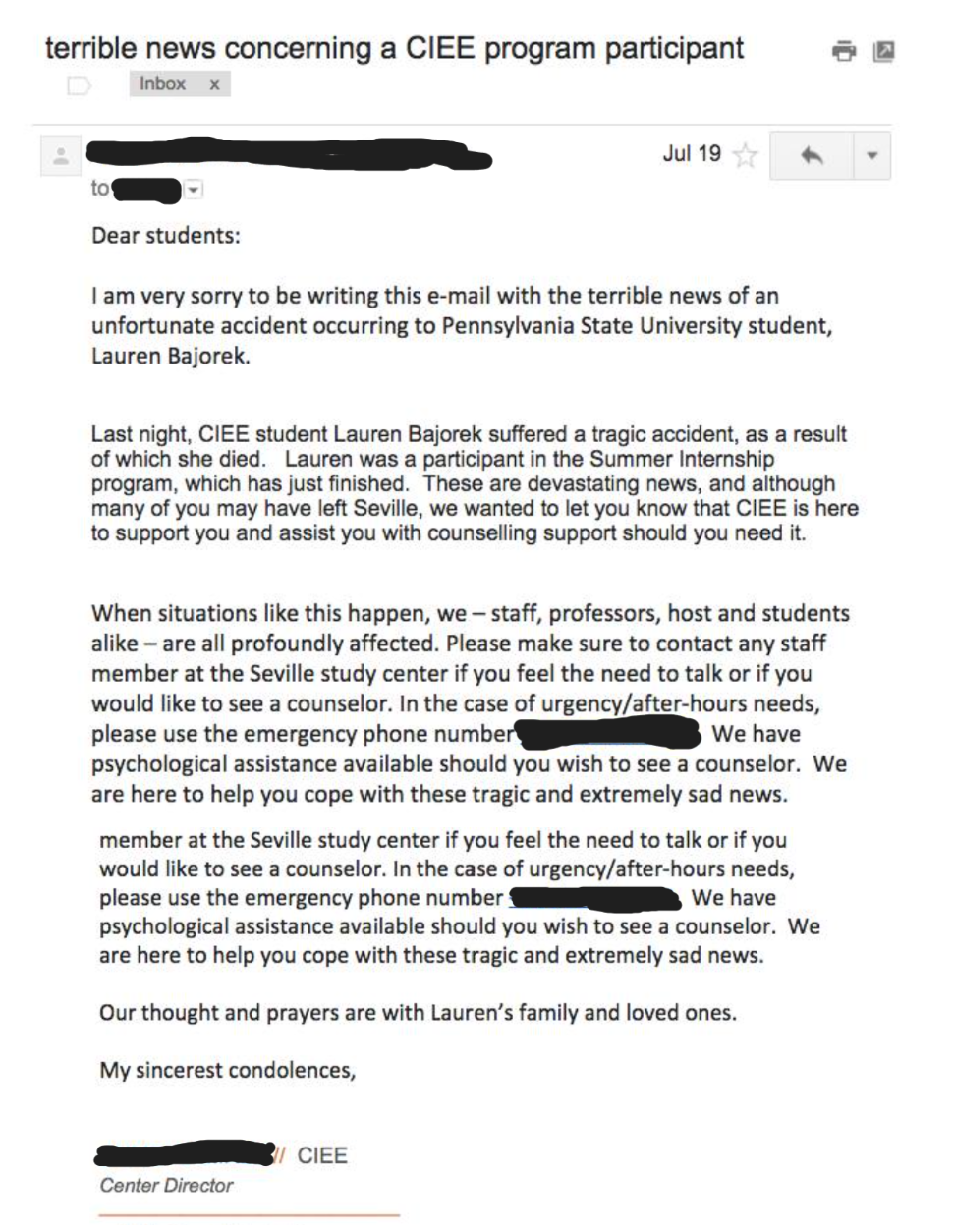
Finally, on Monday, we went back to class. The study abroad program had classes that lasted a month each, and my friends from the first month had already gone home, and a new group of students came in. But I was doing all three months, a different class each month, and I was one of the few people left over from the first month who knew Manuel and some of Lauren’s friends, and I still had a lot of unanswered questions.
Upon returning to school, CIEE held an impersonal memorial service for Lauren. I learned that Lauren went to Penn State as well. I learned that she was known as a sweet and kind person. She played the French horn. We had a lot of mutual friends. I stared at her picture displayed with flowers and thought, God, that so easily could have been me.
From other people in the program, I started getting more details. Lauren had fallen from the roof of a building. Many facts pointed to her death being a senseless tragedy. She was drunk. It was her 21st birthday, and she drank too much, and she fell. She was painted as a dumb college kid who made a foolish and fatal mistake. Case closed.
Other details surrounding her death gave me pause.
Lauren had been separated from most of her friends that night, many of whom were now freezing up and refusing to share details about the night. And the building she fell from? It was Manuel’s apartment. He had brought her there, then left her alone to “hook up with” her friend.
Now, I thought that there were some fishy details about this so-called senseless tragedy. But I had no evidence other than a bad feeling, and you can’t call someone a murderer just because he gave you a bad feeling in your stomach.
There was a girl in one of my classes, Melissa**, who had also been there the first month with me, and she also went to Lagos with Discover Excursions. She had clear, sunned skin, big brown eyes, and a dirty blonde ponytail, and every day she wore the red Discover Excursions tank top that Manuel had given us. According to the rumor mill, she was hooking up with one of the CIEE tour guides who was in charge of the trip. Once after class, I was running my mouth, telling people about Manuel and saying why I didn’t like him, pushing my classmates to ask more questions, and discouraging people from traveling with him, even if it was free. Melissa approached me and said, “Hey, you went on that Lagos trip, right? With Discover Excursions?”
I nodded.
“Don’t tell CIEE that you went with Discover Excursions. You know, if they ask? Just tell them you went alone or you went with friends. Don’t mention Manu.”
I felt goosebumps grow on the back of my neck. “Wait,” I said, “Discover Excursions isn’t part of CIEE?”
She shook her head and said, “No, that’s just Manu’s thing. And the guys asked us not to talk about them with CIEE.”
“But why not?” I pressed. “Like, if they’re a legit agency, then what’s the issue?”
She didn’t seem to have an answer. It appeared to me that she had agreed to share this message without entirely understanding why. She avoided eye contact and waved her hands a lot as she spoke. “It’s just that CIEE has been asking a lot of questions,” she said, “and it might seem weird if, like, everyone is going with Discover Excursions. So just say you went with friends or something.”
“I mean,” I started to reply, but she was already on her way out the classroom door, suddenly in a rush. I walked alongside her to continue talking.
There was a platform that CIEE encouraged us to use to report any trips we were going on, and I had already registered our trip with Discover Excursions before we left. I knew that many other people on the trip had done the same thing. I explained this to Melissa, but she dismissed it with a nervous “Oh, okay,” and she was on her way out of the building.
According to rumors, there was an investigation into Lauren’s death that was soon closed. I tried to bring up my suspicions surrounding the circumstances of her death to various other people, but I felt like an outsider since I didn’t know her, and I worried about being insensitive. It wasn’t until my friend Amaya insisted that she never believed it was an accident that I felt empowered to start telling my side of the story and why I was so reluctant to accept the “random accident” narrative. I started talking about Discover Excursions and Manu to new people on the trip, and I would continue to talk about it for years later, especially when I met young women travelers.
After about a month, a friend of mine from back home who had also been friends with Lauren told me that Lauren’s mother, Carey, was looking for more information from people in the CIEE program. So I messaged Carey on Facebook.
I told Carey that I had heard she wanted more details about Discover Excursions. She asked me about CIEE and our trip itineraries, then she said, “Do you know anything about Manu White?” I said I knew him, and I wasn’t a fan. Carey told me that Lauren had described Manu as “creepy,” then she asked me about these Discover Excursions “girls gone wild” trips. I told her about my experience, and I said that other people on the trip also found the whole situation strange. She said, “I got a written sheet with notes from students. Almost all said, ‘Sorry for your loss.’ Weird. Cold. Even from girls– friends. The ‘friends’ have been aligning stories and clammed up. Like Lauren was nobody. Sickening.” She ended the conversation by telling me, “All I want is the truth… If you think of anything, please let me know. This has been a nightmare.”
She thanked me for my help, but I still wished I could have given her more details. She messaged me a few times later, desperate for more context, but I had already told her everything I knew. Carey, of course, knew more than me about Lauren’s passing but didn’t share much about it at that time.
In the fall, I returned to Penn State, which is in State College, Pennsylvania, for my third year. In 2017, my senior year, about two years after I got back from Spain, Carey messaged me on Facebook and asked me to meet up in person and treat me to lunch, presumably to see if I could give her any more information that maybe I had forgotten. Her request made me somewhat uncomfortable, but I figured that if she was meeting up with me, someone who was only peripherally related to the situation, then she must be desperate. I reluctantly accepted to meet with her at a cafe near my apartment.
I waited for Carey while I worked on my thesis on my laptop. When she arrived, I was struck by the sight of her. She was pale and hunched over. She had great difficulty breathing and walking, so she arrived with an oxygen machine. It was as if her grief were a physical burden. Even with her illness, I could still see that some of Lauren’s pretty features had come from her; her wavy blonde hair, quick eyes, and high cheekbones.
Carey told me that Lauren was an only child. I asked her if it was difficult for her to be at Penn State’s campus, but she said it was actually comforting in a way because she liked to walk around and picture Lauren walking here, imagining what went through Lauren’s head as she looked around at the small town. She showed me a few pictures of a memorial for Lauren in State College and some images of Lauren as a little girl. She told me stories about signs that she believed she got from her daughter in the form of butterflies or a china cabinet light inexplicably turning on.
Then she started to push for more details about Manu White and Lauren’s death. I repeated what I knew, but she begged for anything else, even if they were just whispers. I shook my head and said all I knew about Lauren’s passing were “rumors.” “The other kids on the program, we knew so little,” I said, “They kept us in the dark.”
“What rumors? What do you mean by ‘rumors?’ What else did you hear?” She asked me, her energy suddenly changing and becoming more intense.
I glanced around and said, “No, it’s– I’d rather not say. They’re just rumors.”
“Like what?” She asked. “What were the rumors?” We went back and forth like this a few times.
Feeling cornered and knowing she would continue to ask, I swallowed a pit in my throat and said, “I heard. Well… There was a rumor that she was naked when she fell.”
Carey became suddenly quiet and looked down, visibly disappointed. I figured she had been hoping for something more incriminating against Manuel, but I didn’t have it.
“I’m sorry,” I said immediately, “I wish I knew more.” But Carey was shaking her head and crying again. Then, she told me about messages that Lauren had sent her before her untimely death.
Carey told me that Lauren’s best friend was studying abroad elsewhere in Europe, and they decided to link up in Lagos on the same trip I went on. In fact, Lauren’s final Facebook profile picture was at the same location in Portugal (nicknamed “end of the world”), where I had also posed for the Instagram photo that I shared above.
Carey told me that on that trip, Manu had taken a special interest in Lauren’s friend. He began to pepper her with messages and calls, trying to get close to her and spend more time with her. According to Carey, Lauren told him to back off. In response, he began to threaten Lauren until, eventually, Lauren told her mom, “I’m afraid he’s going to do something to me.”
When Carey said that, I could only open my eyes wide in shock. She went on to say how difficult it was, as a mother, to know what she knew and yet feel unable to prove anything.
After an hour or so, we said our goodbyes, and I went to class. The meeting weighed heavily on me, largely because I felt useless in the face of Carey’s pain. Someone close to me said afterward, “I think you let that relationship get too far.” Maybe he was right. With people who knew Lauren personally on the trip remaining so quiet about the event, I worried that my talking about it openly would come across as gossipy or even triggering for those who knew her. So over the years, I told the story personally but never on social media or any other public forum.
In 2017, I graduated from university and, a few months later, got a job as a teacher in the Galapagos Islands. Before leaving, I took a celebratory goodbye trip to stay with a friend in his New York apartment for a weekend before flying out of JFK. Late one night in New York, I got a message from someone I knew in college to whom I had relayed the story of Lauren and Manuel White.
“I’m sorry that this is incredibly dark,” she messaged me on Facebook, “but the first thing I remembered was the story you told me about the girl who passed away the summer we were [in Seville]…do you think there’s a correlation? This has me so shaken up.”
She sent me a video clip from the Today Show, with the title, “Young Woman Alleges She was Raped by Tour Director on Overseas Trip.”
Gabrielle Vega, the woman in the video, told a story that was shockingly similar to mine. She was brought on a trip to Morocco and told it was too dangerous to go out alone. The leader of her trip was a man named Manuel Blanco Vela. When I saw his picture on the Today Show, I felt my throat tense.
“Oh, my God!” I shouted, watching the video on my phone in my friend’s apartment, causing him to look up from his laptop with raised eyebrows. “That’s him! That’s him!” I yelled and pointed. It was an image of the man who I knew as Manuel White. In a comically uncreative act, he had given us a fake name that was just his real last name translated into English.
But Gabrielle’s story diverged from mine when Manu invited her and a few friends back to the hotel, drugged her drink and raped her while she was incoherent.
This happened to Gabrielle in 2013, and in 2015, when I was there, Manuel was still doing the same thing. It seemed that he moved around Spain study abroad programs with foreign exchange students, managed Discover Excursions, and used the travel agency as a front to gain access to young women who were in a foreign country, dealing with a language and culture they didn’t understand. He encouraged us to drink excessively, and when that wasn’t enough, he used date rape drugs to take advantage of unconscious women. He hired young men to work with Discover Excursions to then also get a part-time job with CIEE or other study abroad programs to draw us into his trips and gain our trust, as we thought it was part of the program. The men who worked with him, like Ignacio, one may assume, got sex with young women and perhaps other perks in exchange for turning a blind eye.
Since I’m writing this on my own accord, I don’t have to say that anything allegedly happened and can instead clarify that I completely believe Gabrielle Vega. Of course I do. Her story with Manu paralleled mine in every way until I walked home alone in Lagos.
And we weren’t the only ones. I became friends with Gabrielle on Facebook not long after she told her story on the Today Show, and she shared on her profile that more than 50 women have come to her and her lawyer with claims of sexual assault at the hands of Manuel Blanco Vela. He was exposed as a serial rapist.
With all the publicity that Gabrielle and a few other survivors (who also shared disturbing stories) were able to bring to the attention of the public eye, Discover Excursions was finally closed permanently.
As soon as I finished watching Gabrielle’s interview that my friend sent me, I messaged Carey and sent her the clip. Carey had already seen it, and she was in conversations with Gabrielle about her daughter. This time, Carey spoke candidly about how she felt about Manu.
“He killed my daughter,” she told me. “She’s not on this earth because of Manu. She didn’t do anything to deserve all this.”
In a rush, I wrote a Facebook post similar to this blog post but much shorter, sharing what I knew about Manuel and Lauren. I asked Carey for permission to post it, and she asked me to first speak on the phone before I did so. We set up a time in the coming week, and I tried to get some rest before my flight the next morning to Quito, Ecuador.
But that night, as I thought about the post, I felt anxious, as if I was sharing too much, too soon. I was nervous to post it without first talking to mutual friends I had with Lauren. So I messaged Carey again, with my phone lighting up my face in the middle of the night. This time, I told Carey that I thought the post might not be a good idea, but she encouraged me to share it anyway, with the one condition that we spoke on the phone first. I told her that I would post it if she thought it was the right thing, but admitted that I was afraid to share something so personal and serious on social media. She said she understood, but she was disappointed. She told me that she was really hoping that this could be a chance to get the word out about what happened to Lauren. She encouraged me to think about it and again asked if we could speak on the phone. I didn’t reply after a few days, and she messaged me again, asking about my travels.
At that point, I was living in Quito, going in and out of government buildings daily to complete the necessary paperwork to get permission to live and work on the Galapagos Islands (that’s another story). Then my visa got approved, and I went to the islands. Once I got there, I was suddenly off the grid. I had some WiFi signal in the school where I worked, but most of the time, I was offline, enjoying quiet moments in nature and with books, not dwelling on the many woes of the news and social connectivity. In 2016, my family had gone through a scary illness, and I felt burnt out by my life in the U.S., but the islands offered a simple oasis. While I had every intention of getting back to Carey and eventually sharing publicly what I knew about Lauren’s story, I didn’t reply to her for months.
When I finally checked in on her profile again, I saw that Carey had passed away to be with her daughter. The burden of grief became too heavy.
If I could speak to Carey, I would tell her that I’m sorry for falling out of touch and I’m sorry for not writing about this sooner. Putting these words on paper hasn’t been easy for me, but at one point, it was important to Carey that I share them.
I read recently that Manuel was ordered by a court in Seville to pay 73,814 euros to Lauren’s family for her death. The article had more details about the night Lauren died.
According to the court documents, Lauren and her friend were at a bar where they found Manuel, who some of her friends knew through Discover Excursions. They passed around a bottle of vodka. Lauren and her friend registered a blood alcohol level that was “borderline comatose,” while Manuel was completely sober. I have to ask myself if he was pressuring them, in the same way he did to me, or mocked them for not being real “Penn State girls.” They returned to Manuel’s apartment, where Lauren got partially naked before getting in a jacuzzi on his roof. Manuel disappeared with Lauren’s friend, and while they were gone, Lauren stumbled and fell off the roof.
Along with the civil case from Lauren’s family, the United States embassy also published a public alert about Manuel being a sexual aggressor. Beyond that, as far as I know, Manuel is still free. I was disappointed to learn that Manu is not off the streets where he can’t hurt more people. It is, in a way, a bit of a relief to learn that there was some form of financial consequence, although I do feel that the amount he was ordered to pay is minimal and, combined with what we know about his sex crimes against women, we can conclude that he’s an incredibly dangerous person who is most likely still violating more people and using alcohol and drugs to do so.
If I can be more blunt, I’ll add that I’m of the opinion that the fact that Manuel Blanco Vela isn’t in a jail cell is an abject failure of the justice system. While finding more articles about Lauren and the other women who were sexually assaulted, I was frustrated (but unfortunately not surprised) to read comments under those articles claiming that his victims were simply women who hooked up with someone while drunk and later regretted it and “decided to call it rape” years later. They say this about women like Gabrielle Vega, who shared in her interview that she still suffered from PTSD after mentally suppressing her experience, who was told by other people on the trip that date rape “isn’t a thing in Spain” and that there’s nothing she can do about it. They say this about Lauren Bajorek, who will never have the chance to regret her actions on the night of her 21st birthday.
After the first time I met Lauren’s mom, she messaged me afterward to tell me a little bit more about Lauren.
“When you asked about Lauren,” Carey wanted me to know, “I missed a key point. She was really funny. And she always wanted people to feel included, and she sometimes did that with humor.”
It was such a mundane detail, but it floored me. It reminded me that in the midst of trying to accumulate facts about Lauren, behind all the rage that I felt toward Manuel and the men who worked for him, there was a young woman, and she will never be older than 21. She had a life before Manuel and friends and family who will miss her long after Manuel is gone. She had a mom who said goodbye to her with a hug in an airport and stood there to keep her eyes on her backpack until she was out of sight, then went home to worry and pray every night that no one would hurt her while she traveled to distant and unknown places.
Some people have chosen to see Lauren as a random foreigner, an object to be used and disposed of, or even just a drunken fool. But we will reject those damaging identifiers and instead see her as a person. A person who deserved better. A person who was very funny and wanted people to feel included, and sometimes did that with humor. A person who, even if she can only see it from the next life, deserves justice for what they did to her. I wish I were optimistic enough to believe that she’ll get it.
But Manuel is one person, one predator. He is not unique or even rare– he wasn’t the first predator I met, or the last. Even if he had been properly locked up, there would be a line of others waiting to replace him. I would like to see study abroad programs and universities keeping this in mind– rather than offering sexual assault awareness courses only telling stories of strangers knocking down bathroom doors, although that does happen, also mention that some of the most vicious acts can be committed by someone who took the time to gain your trust first. And when things like this happen, instead of trying to cover them up with vague emails and promises of counseling, dive right into why it happened and how we can stop it from happening again.
And to the young people who want to get on a plane and find out what the world has to offer you, don’t let the existence of people like Manuel Blanco discourage you from doing so. The Manuel Blancos are not unique, but they are outnumbered. I’ve never traveled somewhere where I didn’t find at least one person who, in spite of language barriers and cultural differences, treated me with love and acceptance. Out of all the gifts that I’ve received through traveling, this must be the greatest: witnessing firsthand that the world is made up of good people, everywhere and all over, which would mean that this world is, in some ways, a good one.
I wanted to add that I am sorry if this story has been emotionally taxing to read; it was for me to write it as well. But sharing it, in a small way, has been helpful to me, and I’m grateful to you for taking the time to read it.
